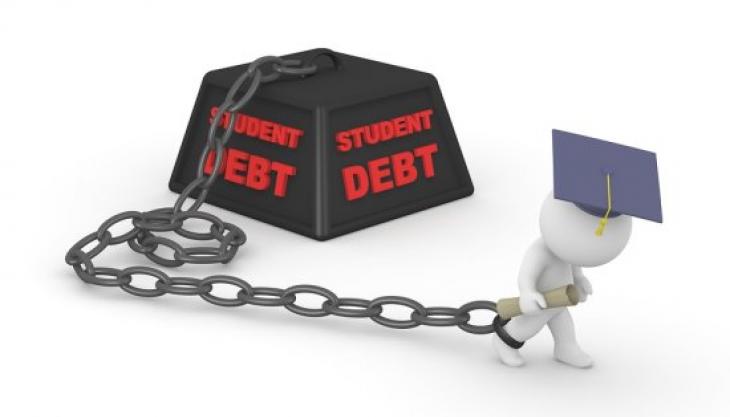Deep in Debt with Student Loans in Default? Have We Got Good News for You
Submitted by Rachel R on Fri, 08/22/2014 - 1:27pm

Student loan debt can drag you down - especially if your loans are in default
Bankruptcy can be a great way to unload debts you simply can't afford to pay, but there are some debts that even bankruptcy can't conquer. Alimony, child support and back taxes when you filed the returns late (or not at all) are all examples of debt that won't diminish in a Chapter 7 or 13 filing. Student loans can be decreased or discharged in bankruptcy, but usually only for those with serious and permanent medical conditions, ongoing poverty and/or the inability to earn a decent wage.
If you have student loans, when you miss a single payment, you're considered to be delinquent. This isn't good news. It will lower your credit rating and trigger collections activities. Once you hit nine months of missed payments (270 days past due), the big hammer drops and you are classified as being in default. This can trigger tons of nasty consequences including wage garnishments, seizure of income tax returns and an even bigger drop in your credit score. None of this is good.
Hope for Those in Default
The only option to get out of default is to refinance, consolidate or rehabilitate your student loans. Refinancing is virtually impossible if your credit score is low. And for far too long, rehabilitation was also infeasible for most cash-strapped debtors, particularly those being garnished. The way it worked was that you had to make regular student loan payments on top of the garnishment for 10 months.
After that, you would be considered rehabilitated and could apply for a more affordable repayment plan. But how many people could afford garnishment plus student loan payments? Not many, so this didn't really help anyone. However, recent changes that came online July 1st make it much more likely that those in student loan default can get out of this bad situation. Under the new rules, you can make “reasonable and affordable” payments to get out of default.
Student Loan Rehabilitation by the Numbers
Reasonable and affordable now means 15% of the excess of your adjusted gross income (AGI) above 150% of the poverty level. AGI is an IRS term that equals your gross wages (this is not take home pay) less deductions (alimony, medical expenses, retirement plan and/or health savings account contributions, etc). In North Carolina, the poverty line for a single person is $11,670. Here's the math if you're earning $35,000 per year and your AGI is $30,000:
$11,670 (poverty line) x 150% = $17,505
$30,000 (AGI) - $17,505 (above calc.) = $12,495
$12,495 x 15% = $1,874 = $156 a month
This means that no matter how much you owe, you can pay $156 a month for 10 months and get your loans out of default. If you earn even less, your rehab payments will be even lower - as low as $5 in some cases. If you're in garnishment now, once you make these smaller payments for just five months, you can request your garnishment stop. This makes rehabilitation feasible for millions who were previously without hope. Once your loans are rehabbed, you can apply for Income Based Repayment or Pay As You Earn that are much more affordable and offers payments as low as $0 if you're unemployed or earning very little.
Student Loan Consolidation – A Get Out of Default Card
Another option is student loan consolidation. This option takes all your federal student loans and combines them into one larger loan. The new loan will not start out in default even if your individual loans were. Once you get the consolidation, you can apply for Income Based Repayment or Pay As You Earn to get payments that range from 10%-15% of your adjusted gross income. This can result in payments as low as $0 for those that are unemployed or earning at or near the poverty line.
The kicker to both of these options is that they are one shot only deals. You can do each one once but if you blow the clean slate you get, then you're out of luck. If you already consolidated and fell behind, the rehabilitation program is your best shot to get out of default. This can end garnishment and greatly improve your credit score.
If you have a whole pile of debts in addition to your student loans, you may want to file bankruptcy first and clear away any other unaffordable bills that are plaguing you before you attempt to rehabilitate your loans. With fewer debt obligations, you should be able to more easily afford the modest payment required to get your student loans back on track.
Contact the law offices of John T Orcutt - North Carolina's bankruptcy experts - to find out more about getting out of debt for good.
Debts Hurt! Got debt? Need help? Get started below!
Serving All of North Carolina
- Bankruptcy Attorneys Raleigh NC (North)
- Bankruptcy Attorney Fayetteville NC
- Bankruptcy Attorney Durham NC
- Bankruptcy Attorneys Wilson NC
- Bankruptcy Attorneys Greensboro NC
- Bankruptcy Attorneys Southport NC
- Bankruptcy Attorneys Wilmington NC
Bankruptcy Attorneys Raleigh NC (North)
6616 Six Forks Rd #203 Raleigh, NC 27615 North Carolina
Tel: (919) 847-9750

Bankruptcy Attorney Fayetteville NC
2711 Breezewood Ave Fayetteville, NC 28303 North Carolina
Tel: (910) 323-2972

Bankruptcy Attorney Durham NC
1738 Hillandale Rd Suite D Durham, NC 27705 North Carolina
Tel: (919) 286-1695


Bankruptcy Attorneys Greensboro NC
2100 W Cornwallis Dr. STE O Greensboro, NC 27408 North Carolina
Tel: (336) 542-5993

Bankruptcy Attorneys Southport NC
116 N Howe St. Suite A Southport, NC 28461 North Carolina
Tel: (910) 218-8682

Bankruptcy Attorneys Wilmington NC
116 N. Howe Street, Suite A Southport, NC 28461 North Carolina
Tel: (910) 447-2987
